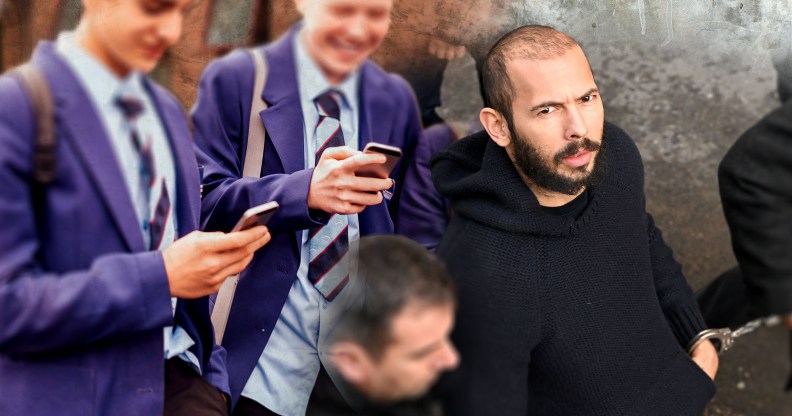As a teacher, I’ve watched students learn misogyny and anti-LGBTQ+ hate from the internet

School pupils are learning toxic behaviours from influencers like Andrew Tate. (Getty)
After lockdown, a gay secondary school teacher noticed one name being repeated over and again: Andrew Tate. It was the beginning of a sharp shift in attitudes resulting in misogyny, homophobia and transphobia, he explains.
While LGBTQ+ inclusion in schools dominates scaremongering headlines, the reality is that a school can be a difficult place to be in 2023. Often hotbeds of queerphobic abuse, one urgent issue causing real harm to students and teachers is misogyny.
Following lockdown, I noticed some concerning and dangerous incidents targeting female staff members. It started with a colleague in her early 20s receiving a number of requests, from a pocket of 15 year old boys, to follow her on social media. She had observed the protocol of using a different display name and ensuring that her content was accessible to friends only. This implied that these young men had gone to trouble to seek her out.
Some stern words from senior staff was only a temporary deterrent. Soon enough, follow requests became direct messages and, at one point, she received an email notifying her that someone had used her school email address to set up a profile on a dating app.
Later that term, the same group of boys accosted my colleague in a busy corridor and circled around her; their arms around one another’s shoulders as they chanted her first name. Although the loud volume of their ruckus drew the attention of enough staff members to disperse the mob, it reduced my colleague to tears. She had to teach many of them that same afternoon.
Other female staff members spoke about groups of boys cat-calling them and making thinly-veiled remarks about their choice of clothing or body shape. One teacher told colleagues how a 14-year-old boy had told her she had a “nice bunda”. When he was reprimanded for his inappropriate remarks, he shouted that “she should be grateful for the compliment”.
I felt it possible that, while remote learning during the pandemic had caused a natural dip in student’s ability to recognise social norms, it had also increased their time spent on social media.
The Andrew Tate effect in schools
I started working in schools in late 2018 and the name Andrew Tate was first put on my radar in early 2022.
It’s difficult to pinpoint exactly when his influence filtered down into the schools I worked in, but after lockdown-induced remote learning, it was not difficult to notice the increase in discriminatory language alongside the rapid decline in overall student conduct.

I started at a new school in September 2022. Tate had become widely known following his online antics that summer, and the boys I taught explicitly stated that they admired his business acumen and his aspirational lifestyle. They felt that his rhetoric about men being “better” than women was relatable for them. It seemed as if he had liberated some young men to a point where they felt these attitudes could be shared.
This presented itself in the classroom when a Year 11 boy, a self-confessed Tate fan, was moved groups after verbally abusing his teacher. Among other insults, he repeatedly told her that she didn’t know what she was talking about and that she shouldn’t have been a teacher if she couldn’t handle him “challenging her”.
He moved to a group taught by a different female member of staff, who saw his behaviour get worse. He would relentlessly make demands of her, and when he received marked work, he would question her professional judgement in the grades she awarded him. It culminated with him turning up at her classroom each break and lunchtime, demanding to know when she would be finished marking his mock exam papers. Although a number of colleagues had intervened by now, he continued to brazenly rifle through her drawers and folders to find them himself.
Other students in the same friendship circles had antagonised male staff they perceived to be gay by making critical remarks about their decision to wear a pink shirt to school, and even asking teachers their sexual orientation in corridors. I was horrified to hear that one student asked a female teacher if she was trans, rationalising his questioning by claiming that “she is very tall”.
While nobody could prove a direct link between Tate’s misogynistic content and these offensive comments, it’s hard to ignore their parallels.
Aside from harsh words, detentions or isolations, schools seem at a loss on how to deal with this attitude from students towards their teachers. Pupil behaviour has deteriorated in recent years and it seems that female teachers are most likely to suffer the consequences. Government data suggests that over 75 per cent of school teachers are women.
Each day, I witness my colleagues receive abusive and derogatory treatment, in addition to increasing amounts of anti-LGBTQ+ rhetoric. I also see how this sense of lawlessness, enabled by Tate, impacts on young girls.
Modern teenagers and children have been exposed to more harmful, often sexualised, online content than generations before them. A dangerous pressure is placed on young girls from every angle on social media, and Tate’s rhetoric continues to radicalise young boys.
This manifestation of loud, rampant misogyny and abuse, spilling over into intolerant homophobia and transphobia, will continue to roll on in our schools until we, as a society, can get a handle on extinguishing the fires that social media fuels, and characters like Andrew Tate start.
From the same author: As a gay teacher, students have never had a problem with my identity – until now.

